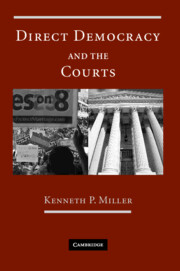Book contents
- Frontmatter
- Contents
- List of Tables and Figures
- Preface
- Introduction: A Clash of Rising Powers
- PART I THE QUEST FOR MAJORITY RULE
- PART II COUNTERING THE MAJORITY
- 3 The Counter-Majoritarian Power
- 4 The Courts at Work
- 5 Conflicts Over Rights
- 6 Conflicts Over Powers
- PART III THE MAJORITY STRIKES BACK
- Conclusion: A New Constitutional Equilibrium
- Appendix: Post-Election Initiative Invalidations
- References
- Index
- References
5 - Conflicts Over Rights
Published online by Cambridge University Press: 05 June 2012
- Frontmatter
- Contents
- List of Tables and Figures
- Preface
- Introduction: A Clash of Rising Powers
- PART I THE QUEST FOR MAJORITY RULE
- PART II COUNTERING THE MAJORITY
- 3 The Counter-Majoritarian Power
- 4 The Courts at Work
- 5 Conflicts Over Rights
- 6 Conflicts Over Powers
- PART III THE MAJORITY STRIKES BACK
- Conclusion: A New Constitutional Equilibrium
- Appendix: Post-Election Initiative Invalidations
- References
- Index
- References
Summary
Perhaps the most troubling allegation against direct democracy is that it places rights at risk. The fear that unfettered majorities will threaten individual and minority rights has persisted across generations, from the Founders to Progressive Era opponents like President Taft to more recent critics like Professors Bell, Eule, and Linde. Determining whether this fear is well-founded requires close analysis. Specifically, we want to know in what ways citizen lawmaking has, in practice, threatened rights and also to what extent courts have mitigated the danger.
We must begin, however, by noting that any such analyses are complicated by a lack of consensus on essential terms. Julian Eule clearly identified the problem: “Assessing the extent to which [initiatives] disregard the rights of minorities necessarily depends on judgments about whom we recognize as ‘minorities,’ what we view as their ‘rights,’ and how we measure voter ‘disregard.’” The definition of “right” is particularly contentious. As Mary Ann Glendon has argued, “In truth, there is very little agreement regarding which needs, goods, interests, or values should be characterized as ‘rights.’” This has long been so. Michael J. Lacey and Knud Haakonssen have observed that “the vocabulary of rights” is deeply embedded in American political culture and “has been worked especially hard in political debate” ever since the eighteenth century: “Slaves cited violations of their natural rights in hopeless petitions to Congress. Abolitionists and their states' rights adversaries both spoke in rights terms.
- Type
- Chapter
- Information
- Direct Democracy and the Courts , pp. 124 - 155Publisher: Cambridge University PressPrint publication year: 2009



